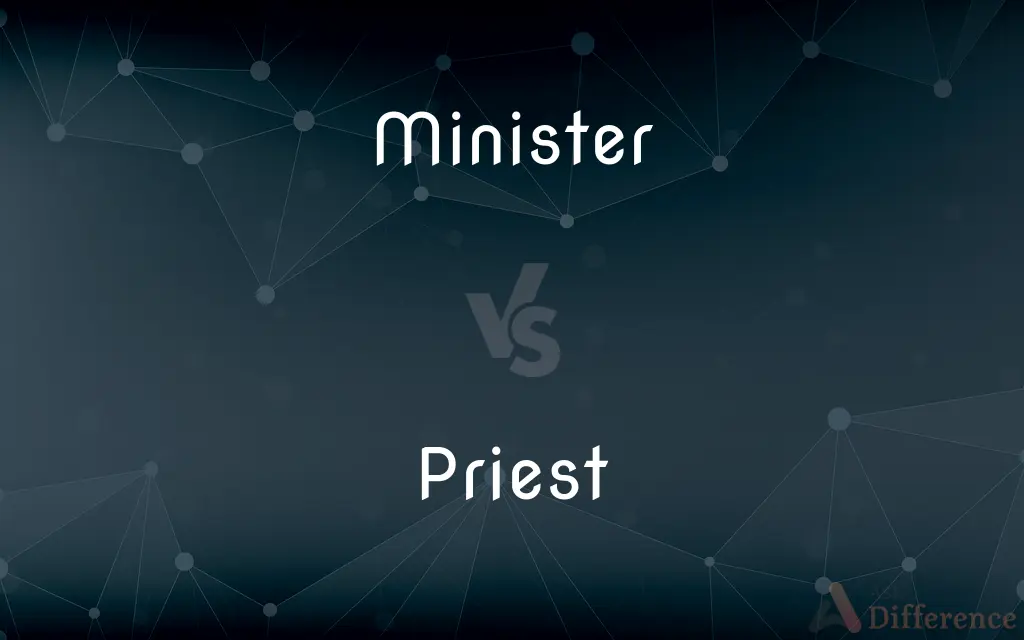Minister vs. Priest — What's the Difference?
Edited by Tayyaba Rehman — By Urooj Arif — Updated on March 26, 2024
A minister is a general term for a clergy member of any Christian denomination, while a priest specifically serves in Catholic, Orthodox, and some Anglican traditions.

Difference Between Minister and Priest
Table of Contents
ADVERTISEMENT
Key Differences
A minister typically refers to a clergy member who leads a congregation or performs religious services across various Christian denominations, including Protestant churches like Baptists, Methodists, and many others. Priests, on the other hand, are a specific type of clergy within the Roman Catholic Church, Eastern Orthodox Church, and some branches of Anglicanism and Lutheranism.
The process of becoming a minister or a priest also differs significantly between traditions. For ministers, the path can vary from denomination to denomination, often involving theological education, ordination by church authorities, and sometimes a period of internship or pastoral work. For priests, particularly in the Catholic tradition, it involves a long period of seminary training, taking vows of celibacy (in the Roman Catholic Church), and receiving the sacrament of Holy Orders.
In terms of authority and hierarchical structure, priests are part of a more strictly defined ecclesiastical hierarchy, especially within the Catholic Church, which includes deacons, priests, bishops, archbishops, and the Pope at the top. Ministers, especially in Protestant denominations, may operate within a less rigid structure, with a greater emphasis on the priesthood of all believers, a doctrine that suggests all Christians have access to God and can minister to one another.
Despite these differences, both ministers and priests share the common goal of serving their congregations, providing spiritual guidance, and fulfilling the religious needs of their communities. Their roles are essential to the religious life of their followers, acting as leaders, caregivers, and symbols of their faith.
Comparison Chart
Denomination
Broadly used across Christian denominations.
Specifically in Catholic, Orthodox, and some Anglican traditions.
ADVERTISEMENT
Role
Preaching, teaching, and pastoral care.
Conducting sacraments and acting as mediators between God and humanity.
Sacramental Role
Varies by denomination; not always emphasized.
Central, with specific sacraments to perform.
Path to Clergy
Theological education, ordination, varies by denomination.
Seminary training, vows (including celibacy in Catholicism), Holy Orders.
Ecclesiastical Structure
Often less hierarchical, varies by denomination.
Part of a strict hierarchy (e.g., Catholic Church).
Compare with Definitions
Minister
Can be ordained or lay leaders, depending on the denomination.
The Methodist minister was ordained after completing divinity school.
Priest
Acts as a mediator between God and people.
In confession, the priest offers absolution to penitents.
Minister
Represents the church in the community.
The minister participated in the interfaith dialogue event.
Priest
Bound by vows, including celibacy in the Roman Catholic Church.
As a priest, he took a vow of celibacy.
Minister
A clergy member leading a congregation, involved in preaching and pastoral care.
The minister at the community church hosts weekly Bible studies.
Priest
Part of a hierarchical ecclesiastical structure.
The priest is assigned to a parish by the bishop.
Minister
Performs religious ceremonies and rites.
The wedding was officiated by a local minister.
Priest
Undergoes specific training and ordination.
After years in the seminary, he was ordained as a priest.
Minister
Provides spiritual counseling and guidance.
She sought the minister’s advice during a difficult time.
Priest
A clergy member with sacramental authority, especially in the Eucharist.
The priest consecrated the Eucharist during Mass.
Minister
One who is authorized to perform religious functions in a Christian church, especially a Protestant church.
Priest
A priest is a religious leader authorized to perform the sacred rituals of a religion, especially as a mediatory agent between humans and one or more deities. They also have the authority or power to administer religious rites; in particular, rites of sacrifice to, and propitiation of, a deity or deities.
Minister
Roman Catholic Church The superior in certain orders.
Priest
An ordained minister of the Catholic, Orthodox, or Anglican Church, authorized to perform certain rites and administer certain sacraments
The priest celebrated mass at a small altar off the north transept
Minister
A high officer of state appointed to head an executive or administrative department of government.
Priest
Ordain to the priesthood
He was made deacon in 1990 and priested in 1994
Minister
An authorized diplomatic representative of a government, usually ranking next below an ambassador.
Priest
In many Christian churches, a member of the second grade of clergy ranking below a bishop but above a deacon and having authority to administer the sacraments.
Minister
A person serving as an agent for another by carrying out specified orders or functions.
Priest
A person having the authority to perform and administer religious rites.
Minister
To attend to the wants and needs of others
Volunteers ministered to the homeless after the flood. See Synonyms at tend2.
Priest
To ordain or admit to the priesthood.
Minister
To perform the functions of a cleric.
Priest
A religious clergyman (clergywoman, clergyperson) who is trained to perform services or sacrifices at a church or temple
The priest at the Catholic church heard his confession.
The Shinto priest burnt incense for his ancestors.
The Israelite priests were descended from Moses' brother Aaron.
Minister
To administer or dispense (a sacrament, for example).
Priest
(Mormonism) the highest office in the Aaronic priesthood
Minister
A person who is trained to preach, to perform religious ceremonies, and to afford pastoral care at a Protestant church.
The minister said a prayer on behalf of the entire congregation.
Priest
(transitive) To ordain as a priest.
Minister
A politician who heads a ministry (national or regional government department for public service).
He was newly appointed to be Minister of the Interior.
Priest
A presbyter elder; a minister
Minister
In diplomacy, the rank of diplomat directly below ambassador.
Priest
One who officiates at the altar, or performs the rites of sacrifice; one who acts as a mediator between men and the divinity or the gods in any form of religion; as, Buddhist priests.
Then the priest of Jupiter . . . brought oxen and garlands . . . and would have done sacrifice with the people.
Every priest taken from among men is ordained for men in things pertaining to God, that he may offer both gifts and sacrifices for sins.
Minister
A servant; a subordinate; an officer or assistant of inferior rank; hence, an agent, an instrument.
Priest
To ordain as priest.
Minister
(transitive) To attend to (the needs of); to tend; to take care (of); to give aid; to give service.
Priest
A clergyman in Christian churches who has the authority to perform or administer various religious rites; one of the Holy Orders
Minister
To function as a clergyman or as the officiant in church worship
Priest
A spiritual leader in a non-Christian religion
Minister
To afford, to give, to supply.
Minister
A servant; a subordinate; an officer or assistant of inferior rank; hence, an agent, an instrument.
Moses rose up, and his minister Joshua.
I choseCamillo for the minister, to poisonMy friend Polixenes.
Minister
An officer of justice.
I cry out the on the ministres, quod he,That shoulde keep and rule this cité.
Minister
One to whom the sovereign or executive head of a government intrusts the management of affairs of state, or some department of such affairs.
Ministers to kings, whose eyes, ears, and hands they are, must be answerable to God and man.
Minister
A representative of a government, sent to the court, or seat of government, of a foreign nation to transact diplomatic business.
Minister
One who serves at the altar; one who performs sacerdotal duties; the pastor of a church duly authorized or licensed to preach the gospel and administer the sacraments.
Minister
To furnish or apply; to afford; to supply; to administer.
He that ministereth seed to the sower.
We minister to God reason to suspect us.
Minister
To act as a servant, attendant, or agent; to attend and serve; to perform service in any office, sacred or secular.
The Son of man came not to be ministered unto, but to minister.
Minister
To supply or to things needful; esp., to supply consolation or remedies; as, to minister to the sick.
Canst thou not minister to a mind diseased?
Minister
A person authorized to conduct religious worship
Minister
A person appointed to a high office in the government;
Minister of Finance
Minister
A diplomat representing one government to another; ranks below ambassador
Minister
The job of a head of a government department
Minister
Attend to the wants and needs of others;
I have to minister to my mother all the time
Minister
Work as a minister;
She is ministering in an old parish
Common Curiosities
Are ministers and priests allowed to marry?
Most Protestant ministers can marry. Catholic priests in the Latin Rite are required to remain celibate, while in the Eastern Rite and in some Anglican traditions, priests may be married.
Can women become ministers or priests?
Women can be ministers in many Protestant denominations. The Catholic Church does not ordain women as priests, but some Anglican and Lutheran traditions do.
Can ministers administer sacraments?
Yes, ministers in many denominations administer sacraments, though the specific sacraments and their understanding can vary.
Do all Christian denominations have priests?
No, the term and role of a priest are specific to certain denominations like Catholic, Orthodox, and some Anglican and Lutheran traditions.
Can ministers and priests perform the same functions within their communities?
While there are overlaps in functions like providing spiritual guidance and conducting services, specific roles (e.g., sacramental duties) can differ based on denomination and theological beliefs.
What's the difference between a pastor and a minister?
"Pastor" is often used interchangeably with "minister" but typically refers to someone who leads a congregation in a pastoral (shepherding) role, focusing on care and guidance.
Is the role of a priest the same in the Orthodox Church as in the Catholic Church?
While there are many similarities in the role of a priest in the Orthodox and Catholic Churches, there are also differences in practices, theology, and liturgy reflecting their distinct traditions.
Do priests have more authority than ministers?
In terms of ecclesiastical hierarchy, priests in the Catholic Church have a defined role within a structured hierarchy, while ministerial authority can vary widely across Protestant denominations.
Are there denominational differences in how ministers and priests are viewed?
Yes, denominational beliefs and traditions significantly influence the roles, responsibilities, and perceptions of ministers and priests, reflecting a wide spectrum of Christian practices and theological interpretations.
How does one become a minister or a priest?
The path to becoming a minister or a priest involves theological education, mentorship, and ordination, but the specific requirements vary significantly between denominations and traditions.
Share Your Discovery

Previous Comparison
Medicare vs. Medibank
Next Comparison
Milady vs. LadyAuthor Spotlight
Written by
Urooj ArifUrooj is a skilled content writer at Ask Difference, known for her exceptional ability to simplify complex topics into engaging and informative content. With a passion for research and a flair for clear, concise writing, she consistently delivers articles that resonate with our diverse audience.
Edited by
Tayyaba RehmanTayyaba Rehman is a distinguished writer, currently serving as a primary contributor to askdifference.com. As a researcher in semantics and etymology, Tayyaba's passion for the complexity of languages and their distinctions has found a perfect home on the platform. Tayyaba delves into the intricacies of language, distinguishing between commonly confused words and phrases, thereby providing clarity for readers worldwide.
















































